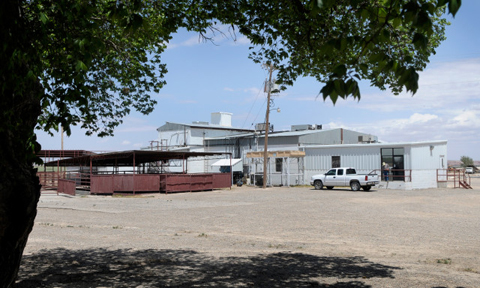
The re-opening of a horse slaughter house in New Mexico has been in the news a lot. Obviously there are different views on whether that is good or a bad thing but I thought you’d like to know the latest.
From the website Thehorse.com
Horse processing in the United States is at a standstill after a federal court ruled that criteria used to award inspection permits to horse process plants was flawed.
Horse processing has not taken place in the U.S. since 2007 when a combination of court rulings and legislation shuttered the last two domestic equine processing plants operating in Illinois and Texas. In November 2011 Congress passed an appropriations bill that did not contain language specifically forbidding the U.S. Department of Agriculture (USDA) from using federal dollars to fund horse slaughter plant inspections. On June 28, Atty. Blair Dunn, who represents the owners of the Valley Meats Co. LLC in Roswell, N.M., announced that the company had received a Food Safety Inspection Services (FSIS) permit. The permit allows placement of USDA personnel at the processing plant to carry out horsemeat inspections. On July 2, the USDA announced that a second processing plant in Sigourney, Iowa, received an FSIS permit to begin processing horses.
Horse processing was slated to begin at both plants on Aug. 5. However on Aug. 2, Albuquerque-based U.S. District Judge Christina Armijo granted a 30-day temporary restraining order preventing those plants from opening.
Dunn said Armijo suspended USDA inspections at the plant on grounds that an environmental review of the plant was flawed. According to New Mexico Attorney General Gary King, the court also prohibited USDA inspectors from further involvement with the New Mexico or Iowa plants.
“Everything is at a standstill right now,” Dunn said.
King, who opposes the plant opening on environmental and other grounds, welcomed the judicial decision. In a written statement, he said, “I am very happy that the judge took into account the public interest which requires a careful evaluation of all the risks to our natural environment and to our residents”
But not all were pleased by Armijo’s decision. Sarah Ralston, VMD, PhD, Dipl. ACVN, a professor in the Department of Animal Sciences at Rutgers University, believes the decision was not necessarily in horses’ best interest.
“Doesn’t anyone see the irony in stopping the safe guards to protect the humane treatment of unwanted horses, forcing them to be hauled further distances (to) where they are not protected, in the name of … ‘saving’ them?” Ralston said. “It is documented in … public records (that) every week hundreds, often over 1,000 horses, ponies, mules, and donkeys are trucked to Mexico alone for slaughter.”
Dunn said that ultimately it will be up to Congress to determine the next step in U.S. horse slaughter.
“Congress will have to act,” he said.
